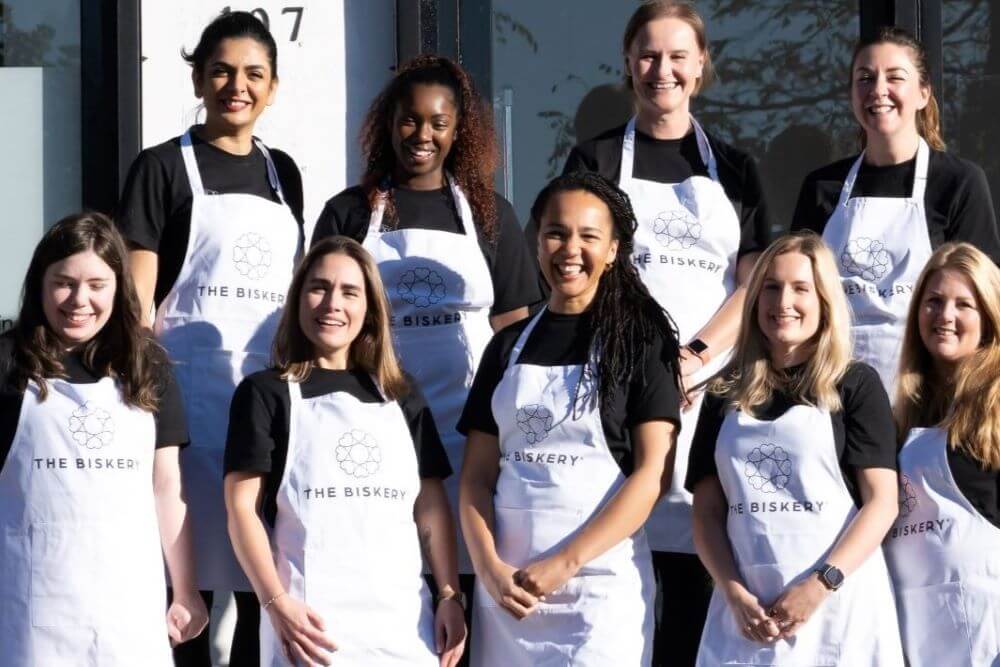Editor CAROLINE PAIGE
This FEMALE LEADERS interview is with co-founders of The Biskery, Saskia Roskam and Lisa Shepherd. When Saskia and Lisa created The Biskery, they were young mothers. They loved work but were frustrated by how inflexible it was. They set out to create fulfilling and productive lives that worked for them and their families.
Now, they’re committed to paying their success forward. They’re ‘rising agents’ – raising awareness of workplace challenges for women and offering solutions. Their employment model offers women the opportunity to rediscover confidence and skills, learn new ones and be an important part of a successful business. I wanted to know more.
Saskia and Lisa invited me to their bakery in Leeds. I was greeted outside by the aroma of biscuits baking. Inside, oven fans hummed – busy delivering that delicious aroma – and there was the chatter of an organised team. Shelving was piled with smart cardboard packaging and greaseproof paper. Packing labels spilled from their boxes. And there were trays and trays of jammy delights arranged in rows and impressed with personalised messages. We pulled three chairs around the end of a long table – of wood block and white resin – made by Saskia’s husband.
So Lisa and Saskia…
How did you meet?
Lisa We worked at a digital marketing agency. Saskia’s Dutch and I’m German – working in a foreign country gave us something in common. Saskia was never at work social events. When I reached out to her, I found she had a different life to the rest of us. We were all young professionals, but Saskia had a young daughter. We started talking by email and she told me she had a home apple pie bakery when her daughter was a baby. I was so impressed. And we started meeting up and baking together.
Saskia When my daughter was born, I wasn’t working and really missed food from home in The Netherlands. I couldn’t find the right apple pie here. So, I decided to create the perfect apple pie. I started selling them at farmers’ markets and people really liked them. But we had a mortgage to pay, so I went back to work and that’s where I met Lisa.

How did The Biskery start?
Saskia We started selling our baking at a monthly market. I took apple pies. Lisa took traditional German cakes and biscuits made from her grandma’s recipe. It really started with the taste of home.
Lisa That was our USP. You could get lots of brownies but nothing from the Continent. Our flavours were a bit different. Everyone knows apple pie, but the Dutch pie has a crumble top. Our biscuits use a different jam to the usual biscuits here. It means ours are familiar treats that taste a bit more special.
Saskia Because of our digital marketing background we automatically started developing a social media profile. It meant we weren’t only visible at the market. People could email us and we started getting requests for personalised biscuits.
Lisa I had a daughter then. The markets were fun, but we were away from our families at weekends. When it rained, we sold nothing. We enjoyed gifting food to our neighbours, but it’d taken three nights to bake and that could be a bit soul-destroying. We decided to focus on biscuits and moved into the gifting market. Biscuits have a longer shelf life and we could charge more as people pay more for gifts. Personalisation – with names and personal messages – makes them extra special.
To a certain extent we were in the right place at the right time. There was a demand for personalised biscuits, but not many people making them. Because of our digital marketing knowledge, we ranked for key terms like ‘personalised biscuits’ or ‘bespoke biscuits’. It was the two of us baking from our kitchens, but we ranked third on Google for those terms.
Saskia Our website used a free template from WordPress that we hosted on a friend’s server. In 2018, we moved to an e-commerce site so people could order online instead of using email. For two years, nobody used it. Then Covid hit. We’d one page optimised for ‘biscuits by post’. Overnight, people started looking for biscuits online and found us.

How did you decide when to leave your salaried jobs?
Lisa We sent out free biscuits to lift people’s spirits during the pandemic. We thought we wouldn’t be busy as we mainly made biscuits for corporate events – and they’d stopped. We still had our day jobs and our kids to home school, but we wanted to do something. We tried to spread a little hope and joy with our biscuits.
We made biscuits with messages like ‘stay safe’ and ‘miss you’. People could nominate someone and we sent them a biscuit for free. We received heartwarming messages thanking us and we realised the power of kindness. That’s a pivotal sentiment we’ve brought into our new branding. We thought deeply about what it is we do. We’re spreading kindness in biscuit form.
People loved what we were doing and our sales quadrupled. Our corporate sales had disappeared. But the consumer sales carried us through. We survived the pandemic and thought what are we waiting for? Let’s go all in.
Saskia I was made redundant from my day job in the summer after the first lockdown. That ended up being the biggest gift. Lisa quit her job three months later. Everything changed then. We found a kitchen and hired three part-time team members.
Lisa Thinking back. It was scary. There was money in the bank because we hadn’t paid ourselves. There wasn’t a lot, but it was enough. We couldn’t afford premises or a team. So, we asked our previous employer if we could use the staff canteen. It was empty because people hadn’t returned to the office after the pandemic. Who does that? I’d just quit my job and I was asking to use the kitchen! But if you don’t ask, you’re already working in the no situation. So why not ask?
We paid around £400 a month to use their kitchen. And that’s how we could afford to just about get things together in the first few months. Then we could start employing a few people part-time and making changes the business desperately needed – new packaging and a better website. The things we’d never had time to do because our spare time was spent baking and packing. More orders came in and we moved to new premises with a bigger team and a new brand.
Why is kindness an important part of The Biskery’s business strategy?
Saskia We try to listen to each other and to the team. Most of them are working mums and we know how difficult the juggle is. We enter conversations with our team by saying what we can offer them and asking if it would work for them. Everybody’s situation is different, so you can’t just do the same for everybody.
Our gratitude biscuits are also a form of kindness. We help people to share feelings of appreciation and gratitude. When we gave away biscuits during the pandemic, the emails we received told us those small gestures brought tears to people’s eyes. It’s just a biscuit. But it’s also an extension of someone’s intention and feelings.
Kindness isn’t always outwards. It has to be inward too. We’ve had to learn how to do that in business. How to be kind to ourselves. It’s a big thing to take on running a business and be an employer. It comes with a lot of feelings.

Your business can only grow as fast as you.
Is happiness part of your business strategy?
Lisa Yeah. If you’re not clear on your values, you might be carried away by other things. Don’t get me wrong. If we land a big order, I’m happy because it keeps us going. But if you just focus on your bank account, I don’t think it will make you happy. I listen to Steven Bartlett’s podcasts. He speaks to lots of really rich people and they all say the same – that being rich isn’t what makes you happy. So, why chase it?
Your business can only grow as fast as you. You to need to check in with yourself and develop yourself. If you don’t take time out to assess where you are and if it’s where you want to be, it’ll crash at some point. Maybe we had to focus because we’re mums and only had so much time to give the business. It made us very efficient with our time and energy.
You’ve said you think the standard business model is broken for working mums. Do you still think that?
Saskia Flexible working has helped a lot of women. But there are still lots of mothers who can’t get the work flexibility they’d like and leave the workforce. I don’t think it will add up in the long-term. Businesses are losing those skills and their investment because they weren’t ready to allow even a four-day week. Or because we can’t start work fifteen minutes later and have a shorter lunch.
It’s a lack of trust – where managers feel their people can’t manage their own time. It’s ridiculous. It should be about output, not time plugged to a desk. You know the picture. You can do a job in five hours and Tim sitting next to you takes six and a half – and somehow that’s better.
How do you cycle sync your life and business?
Lisa We started cycle tracking a few years ago after we read Wild Power. It’s about working with your cycle. Rather than depleting your energy then crashing and feeling horrible about yourself. We keep a chart so we know where our energy levels are. We thought it might be a bit much for our team. So, we gave them a copy of the book and said this is what we’re doing and you might find it helpful.
We want to bring empathy to work. We have a chart with little coloured magnets we can stick next to our name when we arrive in the bakery. I guess it gives the team space to feel the way they are feeling. They might feel quiet and they can be – no questions asked.
Saskia It’s a big part of how Lisa and I communicate. There’s no point having big conversations when you feel like that. I can’t wait to share it with my daughter. I wish I’d known about it in my teens.
Lisa Some women might not have a cycle and some might not be as affected by it. But it’s worth knowing how your natural cycle affects you. It works for us and helped bring understanding and kindness to how we work.

Small steps are bigger than you think.
Can you recommend another good read?
Lisa I’d recommend Untamed by Glennon Doyle.
Saskia My favourite book is The Wisdom of Insecurity by Alan Watts.
Who inspires you?
Lisa Anna Whitehouse, a journalist who campaigned for flexible working. Without her, the act probably wouldn’t have passed. And Joeli Brearley who runs the Pregnant Then Screwed campaigns to improve women’s rights in the workplace. Two days after she told her employer she was pregnant with her first child, she was sacked by voicemail. When I returned to work from maternity leave, I lost my senior title and couldn’t be client servicing any more.
Your role changed when you returned from maternity leave?
Lisa I wanted to work part-time and they thought if a client wanted to meet on a day I wasn’t in the office it would be unprofessional. It’s the sort of stuff I hope we’ll laugh about in ten years’ time – that thinking was so limited. Many women have lost careers, money and security because of this thinking. We’re not actively campaigning for change, but we’re showing that things can be done differently. Hopefully, it inspires other women to build lives that work for them.
What advice would you give women thinking of starting something new?
Saskia Small steps are bigger than you think. If it’s a big thing for you to take that first step, then that’s a huge thing you did.
Lisa Clarity comes from action not thought. We’ve made so many mistakes, but that’s when we’ve learned the most. You don’t need everything laid out when you start. But do start. Something might not make sense for a while. My husband asked for years why I worked so hard every night. One Christmas, Saskia and I were in her bedroom packing orders surrounded by boxes. We were so tired. We were doing something we enjoyed and working towards a change – although we didn’t know what it would be.
I think that’s a good enough reason to do something. I’d love to give that to other women who’re in a similar position – thinking things can’t go on the way they are. And to tell them to make the change.
One more question. Can I have a biscuit?
Lisa I’ll get the jam!

The Biskery is a bakery in Leeds that specialises in branded and personalised biscuits. They began with a passion for tasty bakes from their home countries. And a desire to share what they made with the people around them. From small beginnings at the kitchen table, co-founders Lisa and Saskia now supply speciality biscuits to people and organisations across the UK and abroad.








